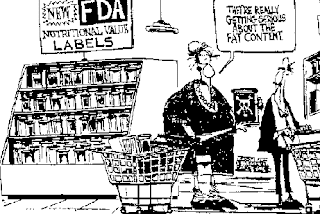Up for debate…
We all know of the massive campaign to stop people from smoking. A person who wants to smoke nowadays is quite restricted to where and when to light up. Not only are they harming themselves, but impose the health-risks to those unfortunate enough to be caught in the same zone as the smoker.
As you can tell, I can’t stand smoke. Don’t confuse this with not liking those who do smoke. If I can smell the smoke on you, you are WAY too close to me. If you smoke around me…I’ll move away. I have friends who smoke. They just respect my views on smoking. The same can be said for other ‘vices’. I am aware that Henry can’t stand the smell of coffee on my breath, as I abhor the smell of beer on his. Most times, we are aware of this, and respectfully try to avoid making the other person gag. It’s always a ‘give and take’ kind of thing.
Or so I thought until I read ‘this month’s debate’ in the Oct 2007 issue of Shape magazine. The question put to readers was,
“Should all restaurants be forced to use trans fat-free oils?”
(can you see where I’m going with this? Reminds me of the beginning of the campaign to stop smoking in public places)
At first I was surprised at the polling results…56% Yes, 44% No.
With obesity at an all time high and health care costs seemingly reflecting this, are we at the stage where public opinion will sway and elevate as the smoking issue did to force restaurants to the ‘healthy choice’?
There are good arguments for both sides.
Those that said yes obviously mentioned the health benefits, and the supposed ease to switch from non-healthy to healthier oils to improve people’s diets.
Those that said no, pointed out that the measure was too extreme, and as an alternative, restaurants should be forced to provide nutritional information for all their meals so that diners could make informed decisions. I really liked one readers response, “When it comes to helping people manage their weight, banning trans-fat oils won’t make as much of a difference as taking more drastic measures, like serving smaller portions.” Another reader said that a person should just stay home and cook if they are that concerned.
Like everything in today’s world, I think that society will dictate changes, with the media fueling the debate.
I am still on the fence with this one. I do think the idea has merit, but is society ready for all these ‘good for you’ decisions made for them? Restaurants and bars always seem to be the industries suffering the brunt of these ‘changes’. Will targeting just these industries be enough to change the obesity and health care costs concerns?
How much will THIS ONE cost the average taxpayer?
What is your opinion?
![BOOKS [Currently reading...]](https://blogger.googleusercontent.com/img/b/R29vZ2xl/AVvXsEjVylbCpPFafy09-x6peLpECYbPJfX31bFgYPgtBWGbClOe5t67w5T5dGnSA32rxXpjwOvm1mkgW9R-HfBaBilgAyUV6CGb5uBbngToBYIM-S8H67VYNVZRADyQH7duSalVoFQE/s150/I+am+number+four+cover.jpg)





2 comments:
I believe that the portion size for meals have grown to the extreme. I think that the obesity rates in North America can be attributed to the fact that everybody is just eating too much.
Hamburgers are 2 and 3 patties, fries are super sized and drinks may soon be coming in pails instead of cups. It starts the cycle - my stomach is not full, therefore I am hungry. Get some more food, stretch my stomach some more, next week I need 3 burgers to feel full.
The only people who win here are the restaurants and fast food chains who continue to make it up in volume.
I see it myself in my kids, they eat a hamburger and quickly ask for the extra burger or wrap of something to top it all off. I always say to them, wait until the first portion of food hits your stomach. Usually within 10 minutes, they are not interested in other food.
I may be out to lunch on this one but I am sticking to my gut feeling that food portion size is driving the obesity rates to the extreme. ;)
Let me know what you think.
Jim L
Yes, I agree. I think that portions need to be smaller. Society certainly drives these things though.
Post a Comment